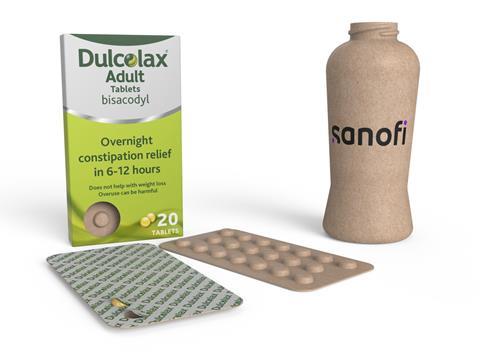
Sanofi Consumer Healthcare has joined PA Consulting and PulPac’s Blister Pack Collective in a bid to produce fibre-based blister packs that can be recycled in the paper waste stream and phase out ‘problem plastics’ in pharmaceutical packaging.
Formed in 2022, the Blister Pack Collective consists of businesses in the pharma, consumer health, and FMCG industries and intends to create a tablet blister pack made of PulPac’s Dry Molded Fiber. This is expected to phase out ‘problem plastics’ like PVC and cut down on the 100,000 tonnes of plastic said to be used in the medical packaging sector every year.
Dry Molded Fiber technology claims to leave a CO2 footprint that is 80% lower than plastic and wet moulded fibre and require a minimal use of water. In blister pack applications, it is thought to enable manufacturers to maintain the design and tablet count of traditional PVC packs.
Sanofi is a founding member of the Blister Pack Collective – as well as the similar Bottle Collective, which seeks to develop a Dry Molded Fiber bottle for food, drink, consumer health, and FMCG applications – and it is now investing in the development of Dry Molded Fiber packaging. It hopes to unlock blister and bottle solutions that are recyclable with paper packaging, reducing or eliminating its own single-use plastic packaging and enhancing the environmental profile of its product portfolio.
“We are delighted to join forces with Sanofi CHC on the Blister Pack Collective,” said Tony Perrotta, PulPac partnership lead at PA Consulting. “Sanofi CHC is already leading the way with Dry Molded Fiber integrations in their Bottle Collective work, and this additional partnership will lead to a better environmental footprint and reduced plastics in future healthcare packaging.”
Sanna Fager, chief commercial officer at PulPac, continued: “We are very happy that a renowned brand like Sanofi CHC joins the collective and validates the innovative power of Dry Molded Fiber. From the very beginning, we set out to replace single-use plastics at a global scale by building an ecosystem of changemakers around our technology.
“We are excited to see that vision come to life and be embraced by the industry. When brands join forces, change becomes not only possible but also inevitable.”
“We are proud to be a part of the Blister Pack Collective, as we take significant steps to reduce our environmental footprint and contribute to a healthier planet,” added France Depaix, global head of Design, Product Sustainability, and Packaging Innovation at Sanofi Consumer Healthcare. “By fostering collaboration and adopting innovative solutions, we aspire to set new benchmarks for sustainability, inspiring our peers and partners to join us in this transformative journey.”
Bayer previously joined the Blister Pack Collective in its own effort to contribute towards a Dry Molded Fiber blister pack.
In other news, Aldi and TerraCycle are conducting a blister pack recycling scheme for own-label medicines, with the trial encouraging consumers to return their plastic and aluminium packaging to be recycled into new raw materials.
If you liked this article, you might also enjoy:
The Lidl approach to packaging sustainability
How did Brazil achieve its 100% aluminium can recycling rate – and can it be replicated in the EU?
Experts have their say on the EU’s Packaging and Packaging Waste Directive revisions
A deep dive into the most important packaging sustainability trends and solutions














No comments yet